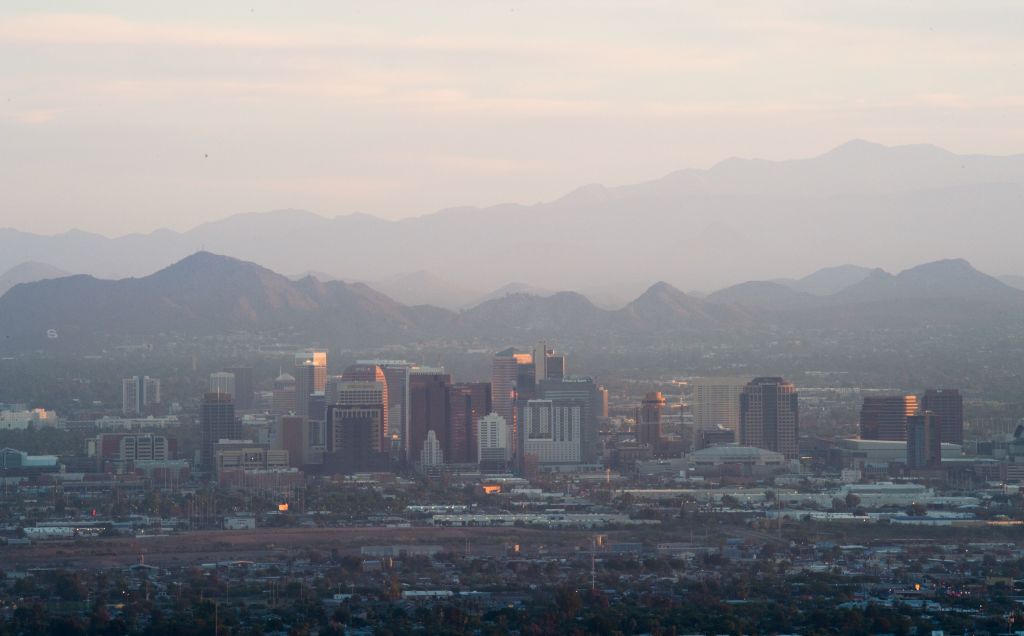How Phoenix is planning for the 'Hurricane Katrina' of heat


A free daily email with the biggest news stories of the day – and the best features from TheWeek.com
You are now subscribed
Your newsletter sign-up was successful
Phoenix, Arizona, is already the hottest major city in the United States, and climate experts expect temperatures to keep rising to the point where there are more than an additional two dozen days per year when the thermometer hits 105 degrees or higher by 2050. That could lead to what Susan Clark, the director of the Sustainable Urban Environments Initiative at the University of Buffalo, describes as a "Hurricane Katrina"-size heat disaster in the U.S.'s fifth largest city, The Washington Post reports.
Such a scenario could be brought on by water becoming too hot, disrupting a power generation system dependent on cooling towers, or wildfires taking out power lines. Citizens would then potentially be deprived of water and air conditioning, two necessities in dangerous heat. Thankfully, there are efforts, led by both experts and community members, to make sure Phoenix is able to evade this type of disaster, the Post reports.
There's been a push to rely more on solar power, and local electric utilities are trying to install "microgrids" around the city that could serve as backup generators in case of an emergency. And Phoenix's chief sustainability officer, Mark Hartman, is developing a network of "cool corridors" which would mean no resident is more than a five-minute walk from water or shade. Another method is to plant more trees, which can lower air temperatures through a natural process called evapotranspiration; eventually, Hartman hopes the city's tree canopy expands to a quarter of its area. Similarly, there is a multi-million-dollar program to repave roads with materials that reflect rather than absorb heat as asphalt does.
The Week
Escape your echo chamber. Get the facts behind the news, plus analysis from multiple perspectives.

Sign up for The Week's Free Newsletters
From our morning news briefing to a weekly Good News Newsletter, get the best of The Week delivered directly to your inbox.
From our morning news briefing to a weekly Good News Newsletter, get the best of The Week delivered directly to your inbox.
Mayor Kate Gallego (D) says she hopes this all results in Phoenix becoming "the most sustainable desert city on the planet." Read more at The Washington Post.
A free daily email with the biggest news stories of the day – and the best features from TheWeek.com
Tim is a staff writer at The Week and has contributed to Bedford and Bowery and The New York Transatlantic. He is a graduate of Occidental College and NYU's journalism school. Tim enjoys writing about baseball, Europe, and extinct megafauna. He lives in New York City.
-
 Why is the Trump administration talking about ‘Western civilization’?
Why is the Trump administration talking about ‘Western civilization’?Talking Points Rubio says Europe, US bonded by religion and ancestry
-
 Quentin Deranque: a student’s death energizes the French far right
Quentin Deranque: a student’s death energizes the French far rightIN THE SPOTLIGHT Reactions to the violent killing of an ultraconservative activist offer a glimpse at the culture wars roiling France ahead of next year’s elections
-
 Secured vs. unsecured loans: how do they differ and which is better?
Secured vs. unsecured loans: how do they differ and which is better?the explainer They are distinguished by the level of risk and the inclusion of collateral
-
 Earth is rapidly approaching a ‘hothouse’ trajectory of warming
Earth is rapidly approaching a ‘hothouse’ trajectory of warmingThe explainer It may become impossible to fix
-
 At least 8 dead in California’s deadliest avalanche
At least 8 dead in California’s deadliest avalancheSpeed Read The avalanche near Lake Tahoe was the deadliest in modern California history and the worst in the US since 1981
-
 The plan to wall off the ‘Doomsday’ glacier
The plan to wall off the ‘Doomsday’ glacierUnder the Radar Massive barrier could ‘slow the rate of ice loss’ from Thwaites Glacier, whose total collapse would have devastating consequences
-
 Can the UK take any more rain?
Can the UK take any more rain?Today’s Big Question An Atlantic jet stream is ‘stuck’ over British skies, leading to ‘biblical’ downpours and more than 40 consecutive days of rain in some areas
-
 As temperatures rise, US incomes fall
As temperatures rise, US incomes fallUnder the radar Elevated temperatures are capable of affecting the entire economy
-
 The world is entering an ‘era of water bankruptcy’
The world is entering an ‘era of water bankruptcy’The explainer Water might soon be more valuable than gold
-
 Climate change could lead to a reptile ‘sexpocalypse’
Climate change could lead to a reptile ‘sexpocalypse’Under the radar The gender gap has hit the animal kingdom
-
 The former largest iceberg is turning blue. It’s a bad sign.
The former largest iceberg is turning blue. It’s a bad sign.Under the radar It is quickly melting away
